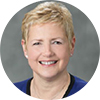Download PDF

By Cynthia A. Bradford, MD, 2017 Academy President
Ophthalmology has been a terrific career choice for me. I’ve been very fortunate in that the first position I was offered was my dream job, and I’m still in that job today. (I’m well aware that that’s a bit unusual as far as most career trajectories go.) It’s gratifying when physician-patients stop me in the hallway to tell me that what ophthalmologists do for our patients is special and that I am lucky to have chosen this profession. What a remarkable compliment to get from other doctors!
Building a Foundation
Education truly is the foundation of our profession, and one aspect of my job that I particularly appreciate is the opportunity to teach—I teach medical students about ophthalmology, and I teach residents how to do cataract surgery. I especially enjoy the magical day in surgical training when residents transition from jittery neophyte to smooth sailing with confidence.
As it happens, my first volunteer position with the Academy was on an education committee. However, most of my Academy-related work has been on the advocacy committees. I learned early in my career—and it came as quite a shock—that state laws don’t always protect patients. Ophthalmologists must be patient advocates at the state level, particularly with regard to scope of practice issues. Along with many of you, I have fought some challenging scope-related legislative battles. Through it all, my involvement with the Secretariat for State Affairs has been profoundly rewarding. I’ve gotten to know colleagues whom I never would have met otherwise. Truly, we have a lot of dedicated, talented, and genuinely nice ophthalmologists across the country, and it has been an honor to work with them.
I have also worked over the years with the Academy’s Leadership Development Program participants and the Young Ophthalmologist Committee and have seen firsthand that we have great ophthalmologists in our leadership pipeline. There’s no question that big changes are happening in our profession, but I believe that, going forward, we will emerge on the “good” side of things, as long as we continually strive to uphold the values passed along to us by leaders in our field and to put our patients first.
Surviving Stress
As president, I plan to focus on something we ophthalmologists don’t often talk about: physician burnout. As we confront the numerous changes and challenges—regulatory and otherwise—that face us, I want us to avoid falling into a negative mindset. That would be corrosive and self-defeating and would only increase the risk of burnout.
Interestingly enough, a Medscape survey that measured stress within the medical profession1 put ophthalmology at the lower end of the scale. (Critical care and emergency medicine were at the top.) Still, there is plenty of stress to go around, and it will come as no surprise to you that survey respondents cited such factors as bureaucratic tasks, electronic health records, and too many hours at work as contributing to it.
I don’t want any ophthalmologist to suffer burnout. As a profession, we can’t afford that kind of loss. Instead, we should resolve to follow the advice we give to our patients: To eat healthfully (and less), drink less alcohol, and move more. We should all be mindful of our psyches and bodies and treat them well—and stop pushing ourselves beyond the point of no return. As the Zen proverb goes, “You should sit in meditation for 20 minutes a day—unless you’re too busy. Then you should sit for an hour.” Truly, if we don’t have time to take care of ourselves at the most basic level, we help no one—not ourselves, not our families, and certainly not our patients.
Why don’t we commit to making self-care a priority, and then watch the responses of our patients, staff, and family members? Treat it as a scientific experiment of sorts. And let me know how it goes: I’d love to hear how this plays out in your personal and professional lives.
___________________________
1 www.medscape.com/features/slideshow/lifestyle/2013/public.